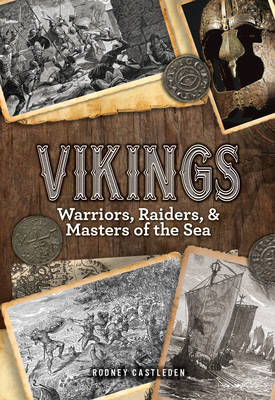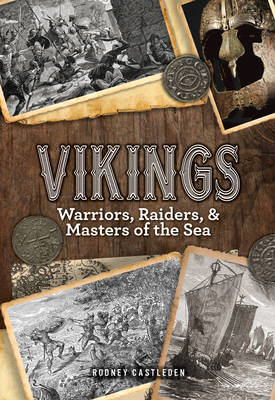
- Retrait gratuit dans votre magasin Club
- 7.000.000 titres dans notre catalogue
- Payer en toute sécurité
- Toujours un magasin près de chez vous
- Retrait gratuit dans votre magasin Club
- 7.000.0000 titres dans notre catalogue
- Payer en toute sécurité
- Toujours un magasin près de chez vous
16,95 €
+ 33 points
Format
Description
In Vikings, historian Rodney Castleden successfully separates the truth from Norse myth and examines the achievements of the Viking Age--the people, their artistry, technological skills, and seamanship. At the gates of Valhalla, Odin, the God of War and Death, welcomed the bravest of the slain warriors arriving in flaming longships for their final battle. It is a fiery legend still celebrated annually in the Shetland Islands, 150 miles northeast of Scotland, where Vikings ruled for 500 years. In the streets of Lerwick, modern-day Norse descendants form vast torch-lit processions, before burning a sacrificial longship in a Festival of Fire called Up Helly Aa! From the late 8th century, when Viking raiders first appeared, to the end of the 11th century, Scandinavian men and women traveled to many parts of the world, from Newfoundland to Byzantium, in a cultural expansion that lasted for 300 years. But tales of terrifying berserkers may have been the mere propaganda of contemporary Christian chroniclers. Beyond the blood and brutality of legend, Viking colonists shared their culture and craftsmanship, leaving behind an enduring legacy. Learn more about the culture and history of the Vikings, and also when to separate myth from truth, in this intriguing book from the Oxford People series. The Oxford People series offers deep dives into the most influential people, subjects, and cultures from history. From horror-fiction legends like H. P. Lovecraft and Edgar Allen Poe, to historical heavyweights like Houdini and JFK, to the supernatural world of vampires, werewolves, and ghosts--Oxford People encompasses it all.
Other titles in this series include: Angels, Che, Creating Sherlock Holmes, Edgar Allen Poe, Extreme Science, Gettysburg, Ghosts, Gunfighters, Houdini, HP Lovecraft, John F. Kennedy, Myths and Legends, Privates and Privateers, Roosevelt and Churchill, Royal Weddings, Skies of WWII, Tesla, Tesla vs. Edison, Vampires, Werewolves, Women of Invention, Zombies.
Other titles in this series include: Angels, Che, Creating Sherlock Holmes, Edgar Allen Poe, Extreme Science, Gettysburg, Ghosts, Gunfighters, Houdini, HP Lovecraft, John F. Kennedy, Myths and Legends, Privates and Privateers, Roosevelt and Churchill, Royal Weddings, Skies of WWII, Tesla, Tesla vs. Edison, Vampires, Werewolves, Women of Invention, Zombies.
Spécifications
Parties prenantes
- Auteur(s) :
- Editeur:
Contenu
- Nombre de pages :
- 192
- Langue:
- Anglais
- Collection :
Caractéristiques
- EAN:
- 9780785837718
- Date de parution :
- 13-08-19
- Format:
- Livre relié
- Format numérique:
- Genaaid
- Dimensions :
- 185 mm x 267 mm
- Poids :
- 884 g

Les avis
Nous publions uniquement les avis qui respectent les conditions requises. Consultez nos conditions pour les avis.






